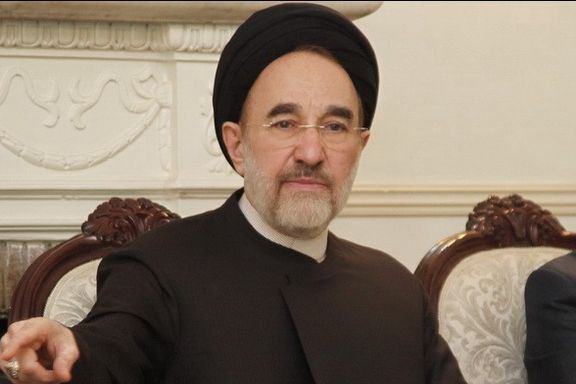Khatami's Election Abstention Sparks Debate In Iran

Former Reformist President Mohammad Khatami's remarks on his refusal to vote in Iran's recent elections have sparked significant controversy among political circles.

Former Reformist President Mohammad Khatami's remarks on his refusal to vote in Iran's recent elections have sparked significant controversy among political circles.
For the first time in his political career, Khatami not only refrained from voting in the parliament and Assembly of Experts elections, despite Supreme Leader Ali Khamenei's repeated declarations that voting is a religious duty, but also defended his decision as a stance in solidarity with the majority of Iranians discontent with the country's governance, in a speech to his advisors on Wednesday.
While many reformists praise him as "a winner" for boycotting Iran's "stage-managed" elections, he faces strong criticism from other political factions and social media users, both within the regime and among dissidents, who accuse him of hypocrisy and opportunism.
In a note on Wednesday, the ultra-hardline Kayhan newspaper, whose chief editor Hossein Shariatmadari is an appointee of Supreme Leader Ali Khamenei, accused him and other abstaining reformists, such as the Etehad-e Mellat (Nation’s Unity) party, of complicity with the “known enemies of the regime”.
“Refusing to participate in the elections is the officially announced instruction of America and Israel. Is it not? So why are you selling your open complicity and collaboration with America and Israel as moving together with the people?” Kayhan wrote.
Khatami's election abstention, however, appears to have reinvigorated reformists who view his action as a significant step forward with the potential to reconcile with Iranians who have been disillusioned with reformists over the past decade.

Protesters in the past few years often chanted not only against hardliners but also against reformists who they saw as part of the system.
Khatami stated that he abstained from voting in solidarity with the many dissatisfied people who believe that "correcting/reforming" the current trajectory of affairs is the only way to salvage the country.
To him, not voting in the current adverse circumstances is another form of voting, and he hopes that his abstention can help restore people's "damaged trust" in the government and political currents, including reformists.
He argued that the country's urgent need is to restore social capital and "settle differences" between the government and people to "save the country from threats and crises," emphasizing that the ruling system has a greater responsibility in reforming its structure, approach, and behavior.
Khatami has faced criticism for his "historical delay" in refusing to participate in the elections managed by Khamenei and his appointees in the Guardian Council, as well as for not officially articulating his departure from "political Islam."
The political act of abstention by Khatami and his supporters can only be taken seriously when they officially denounce political Islam in every shape and form and admit that all people are equal irrespective of their backgrounds, thinking, and lifestyle, one of his critics argued in an article by Ehsan Rastgar published by Zeitoon news website Wednesday.
“As long as it is devoted to political Islam, this school of thought [to which Khatami and his supporters belong] is not different in essence and its overall approach from Shia fundamentalism and people like the leader of the Islamic Republic,” he wrote.
Once an advocate of “religious democracy,” Khatami referred to “developmental democracy” as the ideal form of governance in his speech and seemed to be endorsing secularism in governance.
The use of the term “developmental democracy” has baffled many who expected him to offer a more straightforward and clear definition of the form of governance he is proposing.
“Developmental democracy” is a notion proposed by Richard L. Sklar, a professor emeritus of political science at the University of California in a book of the same name in which he said developmental democracy is the best form of democracy for African countries.
According to his own website, Sklar’s developmental democracy posits a causal relationship between democratic practice and economic development.
This form of democracy has also been interpreted as one that gives priority to cultivating the development of individual abilities and holds that the estimation of democracy lies in its commitment to national and individual improvement.